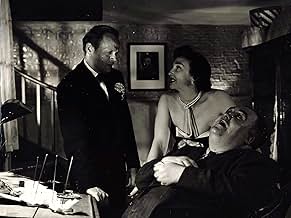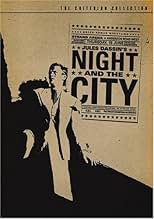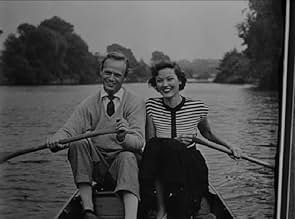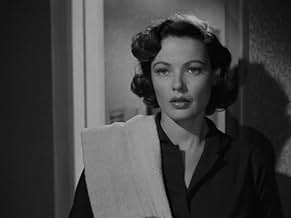NOTE IMDb
7,8/10
16 k
MA NOTE
Ajouter une intrigue dans votre langueA small-time grifter and nightclub tout takes advantage of some fortuitous circumstances and tries to become a big-time player as a wrestling promoter.A small-time grifter and nightclub tout takes advantage of some fortuitous circumstances and tries to become a big-time player as a wrestling promoter.A small-time grifter and nightclub tout takes advantage of some fortuitous circumstances and tries to become a big-time player as a wrestling promoter.
- Réalisation
- Scénario
- Casting principal
Ken Richmond
- Nikolas of Athens
- (as Ken. Richmond)
Paul Beradi
- Diner
- (non crédité)
Derek Blomfield
- Young Policeman
- (non crédité)
Clifford Buckton
- Policeman
- (non crédité)
Ernest Butcher
- Bert
- (non crédité)
Peter Butterworth
- Thug
- (non crédité)
Naomi Chance
- Nightclub Hostess
- (non crédité)
Edward Chapman
- Hoskins
- (non crédité)
Avis à la une
For some reason Night and the City doesn't seem to the credit it deserves; possibly because it was director Jules Dassin's last American film before being blacklisted as a Communist. I wasn't born until the Cold War was winding down, but it seems that with movies like Night and the City to his credit, we could have turned a blind eye even if he really was a Commie.
Honestly this film deserves to rank up there with the likes of The Maltese Falcon, Double Indemnity, or Out of the Past. The scenes of our "hero" Harry Fabian (Richard Widmark, at his best) being chased through London's East End are as starkly beautiful as anything you'll ever see on film. For several minutes there isn't a single shade of gray, everything is literally black or white and the camera itself seems to have joined in hunting Harry. Then there's the long, semi-grotesque wrestling scene that took me totally by surprise, it's like something out of Fellini.
Widmark is utterly believable as Fabian, a charming two-bit grifter who works as a "club tout" but hatches one ill-fated get-rich-quick scheme after another. The rest of the cast is excellent as well, there isn't a cardboard character in the bunch, except maybe Harry's girl Marry (Gene Tierney) though its really more a flaw in the character than the actress. Mary's saintliness may be the writers' only slip-up though, every other character has the sort of depth that makes the film a joy to watch. They inexorably follow their own motivations, which, of course, rely on those of someone else, who inevitably has a goal of his or her own, which will eventually derail the plan of someone whom someone else is counting on (actually, the film is a little less twisted than this review ;-) Criterion has just (2/05) recently released Night and the City and never has the phrase "filmed in glorious black and white" been more appropriate. Before this film seemed to lurk in the shadows of AMC or TCM, only occasionally showing its face, as if it were one of the genre's minor works. Now, if you haven't seen it you have no excuse, and you're only hurting yourself.
Honestly this film deserves to rank up there with the likes of The Maltese Falcon, Double Indemnity, or Out of the Past. The scenes of our "hero" Harry Fabian (Richard Widmark, at his best) being chased through London's East End are as starkly beautiful as anything you'll ever see on film. For several minutes there isn't a single shade of gray, everything is literally black or white and the camera itself seems to have joined in hunting Harry. Then there's the long, semi-grotesque wrestling scene that took me totally by surprise, it's like something out of Fellini.
Widmark is utterly believable as Fabian, a charming two-bit grifter who works as a "club tout" but hatches one ill-fated get-rich-quick scheme after another. The rest of the cast is excellent as well, there isn't a cardboard character in the bunch, except maybe Harry's girl Marry (Gene Tierney) though its really more a flaw in the character than the actress. Mary's saintliness may be the writers' only slip-up though, every other character has the sort of depth that makes the film a joy to watch. They inexorably follow their own motivations, which, of course, rely on those of someone else, who inevitably has a goal of his or her own, which will eventually derail the plan of someone whom someone else is counting on (actually, the film is a little less twisted than this review ;-) Criterion has just (2/05) recently released Night and the City and never has the phrase "filmed in glorious black and white" been more appropriate. Before this film seemed to lurk in the shadows of AMC or TCM, only occasionally showing its face, as if it were one of the genre's minor works. Now, if you haven't seen it you have no excuse, and you're only hurting yourself.
"Night and the City" was the final film for Jules Dassin in the U.S. before being blacklisted. He eventually moved to France but didn't make another film until 1955. Though he is best remembered for the films he did with his wife, Melina Mercouri, this is one of his great movies, a very gritty film noir with London as its background.
Richard Widmark plays Harry Fabian, a low-life con man who makes money as a tout for a club, i.e., he seeks out male tourists and gets them to spend their money there. The club is owned by Phil Nosseross (Francis L. Sullivan) and his wife Helen, who hates her husband and wants to start her own business. Working there is Fabian's girlfriend (Gene Tierney) who loves him in spite of the fact that he's constantly borrowing or stealing money from her.
Harry hits on a scheme to break into wrestling promotion in London. Unfortunately, Kristo (Herbert Lom) has it sewn up. Though his father (Stanislaus Zbyszko, a real-life wrestler) was a great wrestling champion doing Greco-Roman boxing, Kristo does not promote it. This has actually caused a rift between father and son, and Harry moves right in. With the elder Kristo on his side, Harry gets his chance to promote Greco-Roman wrestling. He gets the needed money by promising Helen that he will get her a license to open her business, though the building supposedly can't be licensed for another year. The results of Harry's project lead to tragedy as he brings everybody down with him.
Filmed in black and white only adds to the grittiness of "Night and the City" as Harry runs through London. The film moves as swiftly as he does, leading to the inevitable but exciting climax.
This was a powerhouse role for Richard Widmark, who is a slimy, desperate, and fast-talking Harry. The problem with Harry is, he's really not that good of a con man. He's sloppy. He can get guys into the club but that's about it. He rubs the wrong people the wrong way, and he makes everyone angry until finally, he's a complete untouchable as Kristo chases after him. Widmark gives us a perfect portrait. Tierney is in the film only at the request of Zanuck, who wanted to distract her from her personal problems; she has a surprisingly small role. Herbert Lom is fantastic as Kristo. Stanislaus Zbyszko, whom Dassin sought out, gives a poignant performance as Gregorius the Great. The wonderfully talented Googie Withers is great as the cold and sophisticated Helen. You totally believes she loathes her husband. And Sullivan's Nesseros is easy to loathe as a wealthy worm who plays both ends against the middle to destroy Fabian. They all end up destroying themselves.
Apparently this film did not get appropriate distribution or something, because it's a great film, now out on DVD, and very few people know it. Hopefully, like "Nightmare Alley," another film that was ill-served by Hollywood, it will continue to gain in cult status. It deserves to be seen.
Richard Widmark plays Harry Fabian, a low-life con man who makes money as a tout for a club, i.e., he seeks out male tourists and gets them to spend their money there. The club is owned by Phil Nosseross (Francis L. Sullivan) and his wife Helen, who hates her husband and wants to start her own business. Working there is Fabian's girlfriend (Gene Tierney) who loves him in spite of the fact that he's constantly borrowing or stealing money from her.
Harry hits on a scheme to break into wrestling promotion in London. Unfortunately, Kristo (Herbert Lom) has it sewn up. Though his father (Stanislaus Zbyszko, a real-life wrestler) was a great wrestling champion doing Greco-Roman boxing, Kristo does not promote it. This has actually caused a rift between father and son, and Harry moves right in. With the elder Kristo on his side, Harry gets his chance to promote Greco-Roman wrestling. He gets the needed money by promising Helen that he will get her a license to open her business, though the building supposedly can't be licensed for another year. The results of Harry's project lead to tragedy as he brings everybody down with him.
Filmed in black and white only adds to the grittiness of "Night and the City" as Harry runs through London. The film moves as swiftly as he does, leading to the inevitable but exciting climax.
This was a powerhouse role for Richard Widmark, who is a slimy, desperate, and fast-talking Harry. The problem with Harry is, he's really not that good of a con man. He's sloppy. He can get guys into the club but that's about it. He rubs the wrong people the wrong way, and he makes everyone angry until finally, he's a complete untouchable as Kristo chases after him. Widmark gives us a perfect portrait. Tierney is in the film only at the request of Zanuck, who wanted to distract her from her personal problems; she has a surprisingly small role. Herbert Lom is fantastic as Kristo. Stanislaus Zbyszko, whom Dassin sought out, gives a poignant performance as Gregorius the Great. The wonderfully talented Googie Withers is great as the cold and sophisticated Helen. You totally believes she loathes her husband. And Sullivan's Nesseros is easy to loathe as a wealthy worm who plays both ends against the middle to destroy Fabian. They all end up destroying themselves.
Apparently this film did not get appropriate distribution or something, because it's a great film, now out on DVD, and very few people know it. Hopefully, like "Nightmare Alley," another film that was ill-served by Hollywood, it will continue to gain in cult status. It deserves to be seen.
In London, the swindler Harry Fabian (Richard Widmark) is an ambitious loser, frequently taking money from his girlfriend Mary Bristol (Gene Tierney). When he meets the famous Greco-Roman wrestler Gregorius the Great (Stanislaus Zbyszko) in the arena of his son and the wrestling lord Kristo (Herbert Lorn), he plans a scheme to become successful. He cheats Greorious, promising clean combats in his own arena, and the old man accepts the partnership. However, without money to promote the fight, he invites his boss and owner of a nightclub Phil Nosseross (Francis L. Sullivan) to be his partner, but is betrayed and his business fails ending in a tragedy.
"Night and the City" is a great film-noir, with many twists and another excellent performance of Richard Widmark. The story shows the underworld of London, with low-lives, hustlers, beggars, gamblers and other amoral characters through a magnificent black and white cinematography. The direction of Jules Dassin is sharp and the screenplay perfectly develops the characters and the story in an excellent pace. The Brazilian distributor Oregon Filmes / Fox has one of the best collections of movies labeled "Tesouros da Sétima Arte" ("Treasures of the Seventh Art"). Unfortunately, most of their DVDs shamefully have problems while playing the film, maybe because of the lack of quality of the laboratory they use. My vote is nine.
Title (Brazil): "Sombras do Mal" ("Shadows of Evil")
Note: On 10 October 2016, I saw this film again.
"Night and the City" is a great film-noir, with many twists and another excellent performance of Richard Widmark. The story shows the underworld of London, with low-lives, hustlers, beggars, gamblers and other amoral characters through a magnificent black and white cinematography. The direction of Jules Dassin is sharp and the screenplay perfectly develops the characters and the story in an excellent pace. The Brazilian distributor Oregon Filmes / Fox has one of the best collections of movies labeled "Tesouros da Sétima Arte" ("Treasures of the Seventh Art"). Unfortunately, most of their DVDs shamefully have problems while playing the film, maybe because of the lack of quality of the laboratory they use. My vote is nine.
Title (Brazil): "Sombras do Mal" ("Shadows of Evil")
Note: On 10 October 2016, I saw this film again.
The rise and fall of small-time hustler Harry Fabain is chronicled in this noir thriller by Director Jules Dassin.
This was Dassin's American swansong, completed just before being named by fellow director Ed Dmytryk before HUAK as a "communist," thus ending Dassin's American career.
He brought to "Night and the City" all the technique he acquired over years of quality movie making. Although born in Connecticut and raised and trained in the US, Dassin's work always had the look and feel of his European counterpart, Carol Reed.
The script here is a decent one with surprise turns, avoiding predictability. Franz Waxman's high pitched score adds excitement to the proceedings and Gene Tierney is a creditable second lead.
Yet it's Richard Widmark on whose shoulders the success of this film ultimately rests. It's not an easy role, as Fabian's character runs the gamut of emotional range as he struggles to wheel and deal his petty schemes amongst assorted lowlife types.
Widmark proves he's well up to the challenge, creating a strong portrait of a small time hood striving for positive payoffs through his callous cleverness.
It's a reminder of how talented and resourceful this actor is, and how he and Dassin meshed to create a film of impact.
Dassin, of course, went on to France after this to engage in a fabulous European period, while Widmark struggled to find scripts worthy of his formidable talents, which turned out to be few and far between.
This was Dassin's American swansong, completed just before being named by fellow director Ed Dmytryk before HUAK as a "communist," thus ending Dassin's American career.
He brought to "Night and the City" all the technique he acquired over years of quality movie making. Although born in Connecticut and raised and trained in the US, Dassin's work always had the look and feel of his European counterpart, Carol Reed.
The script here is a decent one with surprise turns, avoiding predictability. Franz Waxman's high pitched score adds excitement to the proceedings and Gene Tierney is a creditable second lead.
Yet it's Richard Widmark on whose shoulders the success of this film ultimately rests. It's not an easy role, as Fabian's character runs the gamut of emotional range as he struggles to wheel and deal his petty schemes amongst assorted lowlife types.
Widmark proves he's well up to the challenge, creating a strong portrait of a small time hood striving for positive payoffs through his callous cleverness.
It's a reminder of how talented and resourceful this actor is, and how he and Dassin meshed to create a film of impact.
Dassin, of course, went on to France after this to engage in a fabulous European period, while Widmark struggled to find scripts worthy of his formidable talents, which turned out to be few and far between.
Every where Richard Widmark's loser character Harry Fabian turns in this film he finds golden opportunities smothered in bad timing. Widmark utilizes a variation of that smarmy, snickering sinister giggle-chuckle that was memorialized in Kiss of Death.It serves the actor well in this film in its toned-down form but offers up a sort of pathetic body language for Fabian, the character. It may be that this American ex-patriot character is just way out of his depth. His hucksterism is not much appreciated by many of his acquaintances in this seedy London underworld. If Harry Fabian would simply accept that he is destined to be a 3rd rate shill and stooge,he might have fund some small pleasures. However, his mind is a shade too quick and his ambition too pumped. He's a user with not a shread of remorse about stepping on others, ripping them off, keeping one tiny step ahead of exposure. This is a superb film, squalid and sinister in its portrayal of greed, corruption and betrayal.
Le saviez-vous
- AnecdotesDirector Jules Dassin made the film while in the process of being blacklisted. Fox studio chief Darryl F. Zanuck told him it could possibly be the last film he'd ever direct, so he should shoot the most expensive scenes first so the studio wouldn't be able to blacklist him until it was completed.
- GaffesAs Harry is being chased through the streets of London at night, he runs down a set of stairs, then turns and runs down a lit street. In the foreground, the cameraman and director's shadows are clearly outlined against the street.
- Citations
Opening voice-over: Night and the city. The night is tonight, tomorrow night... or any night. The city is London.
- Versions alternativesThere are two versions of this film: the British release and the International/American release. Some examples are: a differing voice-over speech; some changed dialogue; the opening scene where Harry returns home after 3 days away is a different take and the nightclub scenes are longer in the British version. The scores of the two films are also entirely different and alternate shots are used at the ending in the British version.
- ConnexionsEdited into American Cinema: Film Noir (1995)
- Bandes originalesHere's to Champagne
(uncredited)
Written by Noel Gay
Performed by Gene Tierney (voice dubbed by Maudie Edwards)
Meilleurs choix
Connectez-vous pour évaluer et suivre la liste de favoris afin de recevoir des recommandations personnalisées
- How long is Night and the City?Alimenté par Alexa
Détails
- Date de sortie
- Pays d’origine
- Langue
- Aussi connu sous le nom de
- Night and the City
- Lieux de tournage
- Hammersmith Bridge, Hammersmith, Londres, Angleterre, Royaume-Uni(Harry runs across this bridge after leaving Figler's hideout, running to Anna O'Leary's boat shop)
- Sociétés de production
- Voir plus de crédits d'entreprise sur IMDbPro
Box-office
- Montant brut mondial
- 43 024 $US
- Durée
- 1h 41min(101 min)
- Couleur
- Rapport de forme
- 1.37 : 1
Contribuer à cette page
Suggérer une modification ou ajouter du contenu manquant




































